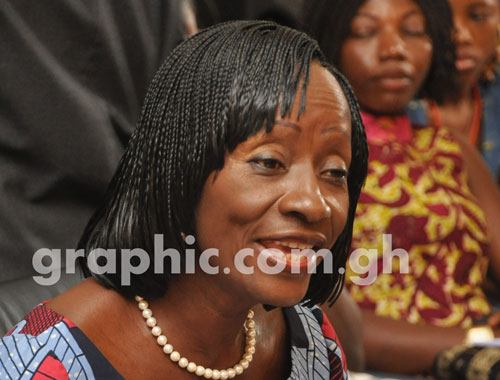‘Join education on adolescent reproductive health’
 The Minister of Health, Ms Sherry Ayittey, has called on religious and traditional leaders to join the crusade to intensify education on adolescent reproductive and health issues among the youth.
The Minister of Health, Ms Sherry Ayittey, has called on religious and traditional leaders to join the crusade to intensify education on adolescent reproductive and health issues among the youth.
She said that was necessary to enable them to make informed choices on family planning issues, adding that the right to decide freely and responsibly on the number of children and spacing of birth (and access to adequate information on reproductive and sexual health), was a basic human rights issue that must be embraced by all.
Launching this year's National Family Planning Week celebrations in Ho in the Volta Region on Wednesday, Ms Ayittey called on the people, especially the youth, to have adequate knowledge and the means to plan their families.
The week-long celebration, which attracted people from all walks of life, including politicians, diplomats, students, health staff, was on the theme: "Your Future, Your Choice, Your Contraceptive, Act Now."
Population and development
The health minister said the relationship between population and development had attracted a lot of global and national discussions, adding that development was not progressing fast enough to take care of the increase in population.
She lamented that “there are indications of our population growing faster due to our exceptionally high fertility rates, which calls for genuine efforts to keep population growth under control in order to accelerate development and growth” and that population issues concerned the rate of growth and not the number of people.
"In the poorest countries, contraception use is low and one in three women has a child before the age of 18. In sub-Saharan Africa, 53 million women want but do not have access to modern contraception, with the majority of them under the age of 20."
Ms Ayittey said pregnancy and child birth-related complications remained the leading killer of teenage girls in developing countries, leading to more girls dropping out of school due to early pregnancies.
Youth sexuality
"We need to reduce the stigma associated with youth sexuality. Even when girls and young women are informed about family planning and services are available, many do not access the services due to fear of reproach or criticism," she stated.
The Volta Regional Minister, Mr Joseph Nii Laryea Afotey-Agbo, called on healthcare practitioners to prioritise the care of pregnant women in order to save their lives. Mr Afotey-Agbo said the Volta Region recorded 35 maternal deaths during the first half of the year, with 15 per cent of them being teenagers.
The minister added that "in order for women to successfully initiate and continue with contraception, they need the support of their husbands or male partners for without this support, some women may abandon the methods and resort to clandestine means," he said.
Mr Afotey-Agbo, therefore, assured the people that the government was committed to their economic goals and would fulfil the aspirations of the people.
High fertility
Ms Adjoa Yenyi, a representative of the United Nations Population Fund (UNFPA), said one important consequence of high fertility for developing countries was the effect of excess child bearing on their family health and their welfare.
Ms Yenyi, therefore, stressed that the major goal of development was the provision of conditions for optimum health and welfare for everyone, and "the opportunities to decide the number and spacing of children is a basic human right".
The Director-General of the Ghana Health Services, Dr Ebenezer Appiah Denkyira, gave an assurance that his outfit would continue to provide good counselling in order to ensure good health and reduce the incidence of maternal and infant mortality in the country. He assured the people that the health facilities had a wide range of high quality family planning commodities to assist the individuals and couples to have control over their reproduction.
Earlier in a welcome address, the Volta Regional Deputy Director in charge of Public Health, Dr Winfred Ofosu, said positive interventions such as immunisation, breastfeeding and growth monitoring, malaria prevention and management, among others, were aimed at reducing maternal mortality and child survival.
He said family planning products were safe. He called on all, including men, to join the campaign, since family planning was not an issue only for women, but for the entire family.
By Emmanuel Modey/Daily Graphic/Ghana